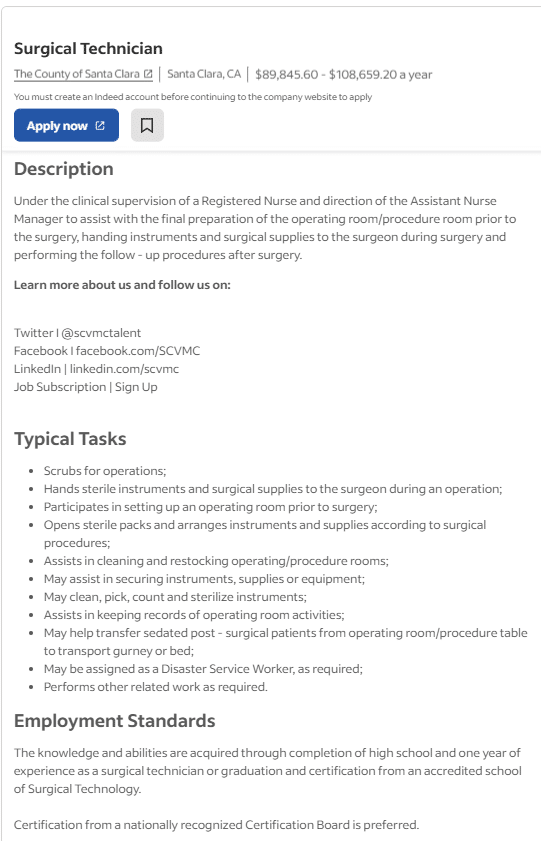If you aspire to become a Surgical Tech, you need to enroll in a formal training program, and after that, you need to get certified, and then start looking for job opportunities.
In that journey, you’ll come across job descriptions. A Surgical tech job description is a formal document that outlines the responsibilities, duties, qualifications, and expectations of a surgical tech within an organization.
In this article, we’ll discuss what a Surgical tech job description looks like with 2 examples and a template, we’ll also discuss all about what employers look for in a Surgical Tech.
Moreover, we’ve also discussed all about the surgical techs, their duties, and how you can become one.
Plus, we’ve also shared info about a recommended online surgical tech program that could make you job-ready in as little as 6 months.
Let’s get started!

What is a Surgical Tech?
A Surgical Tech, also known as a Surgical Technologist or Operating Room Technician, is a key member of the surgical team who assists in preparing operating rooms, arranging equipment, and supporting surgeons during surgical procedures.
Surgical Techs work in hospitals, outpatient surgical centers, and other healthcare facilities. They play a crucial role in ensuring the smooth and efficient operation of the surgical suite.
Their work helps to prevent infections and ensures that surgeries are conducted safely and efficiently.
Here are the Duties of a Surgical Tech
- They prepare operating rooms by setting up surgical instruments and equipment.
- They make sure the equipment and instruments are functioning correctly.
- They assist surgeons and other team members by passing instruments and supplies during surgery.
- They maintain a sterile field to prevent infections.
- They count sponges, needles, and instruments to ensure no items are left inside the patient.
- They handle specimens taken for laboratory analysis.
- They assist in cleaning and restocking the operating room after surgery.
Read:
-> What Does a Surgical Tech Do?
How to Become a Surgical Tech?
Becoming a Surgical Tech involves a combination of education, hands-on training, and certification.
Here’s a quick step-by-step guide:
Step 1 -> Meet basic Eligibility Requirements. A high school diploma or equivalent.
Step 2 –> Enroll in an online, self-paced, accredited Surgical Tech formal training program, like Preppy’s surgical tech program.
But why Preppy?
Preppy’s Online Surgical Tech Program is an accredited, 100% online, self-paced training program that comes with an externship opportunity and makes you ready for certification exams like TS-C or NCST.
Preppy’s program is very affordable costing only $1599, and you can complete it in as little as 6 months. Moreover, as a bonus Preppy offers a free laptop, and 24/7 support whenever you need it.
So, if you want to start your surgical tech career faster, then enroll in Preppy’s Surgical Tech Program.
Step 3 -> Finish your coursework and hands-on training. Ideally, it should take about 6 months.
Step 4 -> Choose a certification. Apply, and pay the exam fee.
FYI – NCCTs TS-C certification is the most popular certification option among students nationwide.
Step 5 -> Prepare for the Exam. Study using your online program’s materials and other resources.
Step 6 -> Schedule and sit for the exam, aiming to pass it on your first attempt.
Step 7 -> Positively wait for your results.
So, by following these steps, you can embark on a fulfilling career as a Surgical Tech, contributing to the successful outcome of surgical procedures and the overall health and safety of patients.
Also Read:
-> How To Become A Surgical Tech?
-> Pros And Cons Of Being A Surgical Tech
-> How To Become A Certified Surgical Tech?
-> How Long Does It Take To Become A Surgical Tech?
Job Description of a Surgical Tech Career
A job description is a formal document that outlines the responsibilities, duties, qualifications, and expectations for a specific role within an organization.
It serves as a comprehensive guide for both employers and employees, detailing what is required to perform the job effectively.
A job description is a crucial tool for managing human resources effectively, ensuring that both the organization and its employees are aligned in their goals and expectations.
Read:
-> Is Surgical Tech School Hard?
Key Sections of a Job Description
Job descriptions can be used for various purposes, including hiring, performance evaluations, and setting expectations.
Here are the key sections:
Job Title: This is where the title of the position is mentioned.
Objective/Overview/Summary: This is where the role and the primary purpose within the organization are stated.
Key Responsibilities: A detailed list of the tasks and duties associated with the position. This section outlines what the employee will be doing on a day-to-day basis.
Qualifications: The necessary education, experience, skills, and certifications required for the job. This section helps to identify the ideal candidate for the role.
Working Conditions: Information about the physical and environmental aspects of the job, including the work environment, hours, and any physical demands.
Career Path: Potential opportunities for advancement within the organization, outlining possible future roles and career progression.
Reporting Structure: Information on who the employee will report to and any supervisory responsibilities the position may have.
Example 1
Employer – XXX
Job type – Full-time
Shift and schedule – XXX
Salary – XXX
Location – XXX
Job Objective
XXX Hospital is seeking a dedicated and detail-oriented Surgical Technician to join our General Surgery Department.
The successful candidate will be responsible for preparing operating rooms, assisting during surgical procedures, and ensuring a sterile environment to support high-quality patient care.
Key Responsibilities
- Prepare and sterilize surgical instruments and equipment before procedures.
- Set up the operating room with necessary surgical supplies and equipment.
- Assist the surgical team by passing instruments and supplies during operations.
- Adhere to strict infection control protocols.
- Count sponges, needles, and instruments before and after surgery to ensure nothing is left inside the patient.
- Handle specimens for laboratory analysis.
- Assist in transferring patients to and from the operating room.
- Clean and restock the operating room after procedures.
Qualifications
- High school diploma or equivalent.
- Certificate of completion of an accredited Surgical Technology training program.
- Certification as a Surgical Technologist (TS-C by NCCT or NCST by AAH) preferred.
- Minimum of 1 year of experience in a surgical setting is preferred.
- Excellent attention to detail and ability to work in a fast-paced environment.
- Strong communication and teamwork skills.
Working Conditions
- Full-time position with shifts including nights, weekends, and holidays.
- Standing for extended periods and handling the physical demands of the job.
- Exposure to infectious materials and the need for strict adherence to safety protocols.
Benefits
- Competitive salary and benefits package.
- Opportunities for professional development and continuing education.
- Supportive and collaborative work environment.
Example 2
Job Title: Surgical Technician
Location: XXX Outpatient Surgical Center
Job Overview
XXX Outpatient Surgical Center is looking for a skilled Surgical Technician to join our team. This position involves working in a dynamic and fast-paced outpatient environment, ensuring that surgical procedures are carried out smoothly and efficiently.
Key Responsibilities
- Prepare operating rooms by arranging instruments, supplies, and equipment.
- Sterilize instruments and ensure that all surgical tools are ready for use.
- Pass instruments and supplies to surgeons during procedures.
- Maintain sterile field.
- Perform sponge, needle, and instrument counts accurately before and after surgery.
- Assist with patient positioning and draping.
- Handle and label specimens for laboratory examination.
- Clean and organize the operating room after surgeries.
Qualifications
- High school diploma or equivalent.
- Successful completion of Surgical Tech training from an accredited program.
- Certification as a Surgical Technologist (TS-C by NCCT / NCST by AAH / CST by NBSTSA) is required.
- At least 6 months of experience in an outpatient surgical setting is preferred.
- Strong organizational skills and attention to detail.
- Good communication skills and a patient-oriented approach.
Working Conditions
- Part-time or full-time positions are available.
- Regular hours with occasional need for extended shifts or weekends.
- Must be able to stand for long periods and perform physically demanding tasks.
Benefits
- Competitive hourly wage.
- Flexible scheduling options.
- Access to continuing education programs and professional development.
- Friendly and supportive work environment.
Job Template

What do employers look for in a Surgical Tech?
As the healthcare industry continues to grow, the demand for skilled surgical technologists is on the rise.
Surgical techs play a critical role in the operating room, assisting surgeons, ensuring a sterile environment, and managing surgical instruments.
For those aspiring to enter this vital field, it’s essential to understand what employers look for in a surgical tech. Key factors include education, experience, certification, and skills.
This article delves into each of these areas to help you prepare for a successful career as a surgical technologist.
Education
Employers prioritize well-educated candidates who have completed formal training programs. There are three main educational pathways for surgical techs.
Certificate/Diploma Programs
Duration: Typically, 9-12 months
Cost: $5,000 to $8,000
These programs focus on core surgical technology skills and prepare students for immediate employment.
Associate Degree Programs
Duration: About 2 years
Cost: $10,000 to $40,000
Associate degree programs provide a more comprehensive education, in-depth training, and a broader skill set.
Online Programs
Duration: 6 to 8 months, depending on the program’s structure
Cost: Up to $2,000
Online programs, like those offered by Preppy’s Surgical Tech Training Program, offer flexibility and affordability. They are ideal for students balancing other commitments and provide comprehensive training that is recognized by employers.
You May Also Like:
-> Surgical Tech Programs Online
-> Surgical Tech Certificate Program
Experience
Practical experience is a crucial component of surgical tech training. Employers look for candidates who have real-world experience in clinical settings, not just laboratory simulations.
In the Lab setting, you get experience with dummy kits, which is beneficial for learning basic skills. This experience is limited and it doesn’t fully replicate the complexities and dynamics of an actual operating room.
While externships in a real healthcare setting provide invaluable hands-on experience. Externships allow students to apply their theoretical knowledge in real surgical environments, working alongside experienced professionals.
This type of experience is highly valued by employers and is often a requirement for job readiness.
Certification
Certification is a key factor that employers consider when hiring surgical technologists. It validates the candidate’s knowledge and skills, ensuring they meet industry standards.
There are two main certification options – TS-C by NCCT and NCST by AAH.
The TS-C certification is the most popular certification among surgical technologists. It is widely recognized and respected by employers.
Also Read:
-> Surgical Scrub Tech Certification
-> Can You Be A Surgical Tech Without Certification?
Skills
Employers seek surgical technologists who possess a specific set of skills. The skills include:
Attention to Detail: Precision is crucial in the operating room. Surgical techs must be meticulous in their work to ensure patient safety.
Manual Dexterity: Handling surgical instruments and equipment requires steady hands and fine motor skills.
Stamina and Physical Strength: The role often involves standing for long periods and handling heavy instruments.
Communication Skills: Effective communication with surgeons, nurses, and other healthcare team members is essential.
Stress Management: The ability to remain calm and focused under pressure is critical in high-stakes surgical environments.
Ultimately, if you want to acquire the education, experience, certification, and skills necessary to become a successful Surgical Tech and potentially become job-ready faster, consider enrolling in Preppy’s Surgical Tech Training Program.
This comprehensive, accredited, online, and self-paced program offers the flexibility to learn at your own pace while providing hands-on training and certification preparation at an affordable price in just 6 months or less.
Surgical Tech Salary and Job Outlook
As per the BLS salary data for May 2023, the annual average salary of Surgical Tech is $60,370, with an hourly rate of around $29 per hour.
Moreover, among the Surgical Techs, the highest 10% are earning upwards of $83,150 per year, and higher. While the lowest 10% of Surgical Techs earn around $40,640 per year.
As per the BLS, the projected employment growth rate for surgical assistants and technologists is projected to grow by 5% in this decade with around 8,600 fresh openings projected each year, over the decade.
Read More:
FAQs – Surgical Tech Job Description

What Is The Difference Between Surgical Tech 1 And Surgical Tech 2?
Surgical Techs often have varying levels of responsibility and expertise, which can be categorized into different levels such as Surgical Tech 1 and Surgical Tech 2.
These levels reflect differences in experience, skills, responsibilities, and sometimes education or certification.
So, the primary differences between Surgical Tech 1 and Surgical Tech 2 lie in their levels of experience, responsibility, and expertise.
Surgical Tech 1 is typically an entry-level position focused on basic support tasks, while Surgical Tech 2 involves more complex duties, leadership roles, and higher-level skills.
As surgical techs gain experience and proficiency, they can advance from level 1 to level 2, taking on greater responsibilities and contributing more significantly to the surgical team.
What Is The Difference Between Surgical Tech and Surgical Assistant?
Both Surgical Techs and Surgical Assistants play crucial roles in surgical teams, the main differences lie in their level of involvement in surgical procedures, training requirements, scope of practice, and career advancement opportunities within the surgical field.
Here are some of the key differences –
Role and Responsibilities
Surgical Tech: Assists surgeons and nurses during surgical procedures by preparing operating rooms, arranging instruments, maintaining a sterile environment, and passing instruments to the surgical team. They do not perform surgical procedures but support the surgical process.
Surgical Assistant: Also known as a Surgical First Assistant (SFA) or Certified First Assistant (CFA), they directly assist surgeons during surgeries by providing hands-on assistance, suturing wounds, controlling bleeding, and handling tissues and organs. They have a more active role in the surgical procedure itself.
Training and Education
Surgical Tech: Typically completes a program in surgical technology, which includes education in anatomy, physiology, surgical procedures, and sterile techniques. They may obtain certification such as TS-C by NCCT or CST by NBSTSA.
Surgical Assistant: Requires more advanced training, often through a surgical assistant program or on-the-job training with extensive experience in surgical procedures. They may also obtain certification as a Certified Surgical First Assistant (CSFA) or Certified Surgical Assistant (CSA).
Certification and Scope of Practice
Surgical Tech: Focuses on preparing and maintaining the surgical environment and assisting with instruments. Their scope of practice is limited to non-invasive tasks under supervision.
Surgical Assistant: Has a broader scope of practice, including direct involvement in the surgical procedure, assisting with surgical techniques, and providing critical support to surgeons. They may suture, handle tissues, and perform other advanced tasks during surgeries.
Level of Supervision
Surgical Tech: Typically works under the supervision of surgeons and registered nurses, assisting as needed during surgeries.
Surgical Assistant: Often works independently under the guidance of surgeons, performing tasks that require advanced training and expertise in surgical procedures.
Career Path and Responsibilities
Surgical Tech: Primarily focuses on supporting surgical procedures and maintaining a sterile environment. They may advance to senior positions or specialize in specific surgical specialties.
Surgical Assistant: Advances to higher-level roles within surgical teams, potentially becoming lead assistants or specializing in complex surgical procedures. Their role involves more direct patient care and surgical technique application.
What Is The Difference Between Surgical Tech and Sterile Tech?
Surgical Techs and Sterile Techs, both play a crucial role in their respective fields. Many confuse these two fields as similar ones but they are not.
Here are some of the key differences between a surgical tech and a sterile tech –
Interaction with Surgical Procedures
Surgical Tech: Actively participates in surgeries by handling instruments, assisting surgeons, and ensuring a sterile environment.
Sterile Tech: Prepares and sterilizes instruments for surgical use but does not take part in the surgical procedures themselves.
Role and Responsibilities
Surgical Tech: Assists directly in surgical procedures. Prepares operating rooms, arranges and hands surgical instruments to surgeons, maintains sterile fields, and supports the surgical team during operations.
Sterile Tech: Focuses on the decontamination, sterilization, and preparation of medical instruments and equipment. Ensures all surgical tools are sterilized and ready for use in various medical procedures.
Work Environment
Surgical Tech: Works primarily in operating rooms within hospitals or surgical centers, closely interacting with surgeons, nurses, and patients.
Sterile Tech: Works in sterile processing departments or central supply areas of hospitals, usually behind the scenes, with less direct patient contact.
Training and Certification
Surgical Tech: Requires specialized training in surgical technology through accredited programs, including clinical externships. Certification options include TS-C by NCCT, NCST by AAH or CST by NBSTSA.
Sterile Tech: Requires training in sterile processing and distribution, which can be completed through certificate programs. Certification options include CRCST by HSPA and CSPTD by CBSPD.
Scope of Practice
Surgical Tech: Directly involved in the surgical process, assisting with procedures and patient care in the operating room.
Sterile Tech: Ensures the cleanliness, functionality, and availability of surgical instruments and equipment, but does not participate directly in surgeries.
Related:
-> CVOR Tech
-> Scrub Nurse Vs Surgical Tech
-> 6-Week Surgical Tech Program
-> Surgical Tech Vs Surgical Assistant





